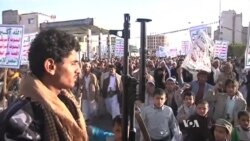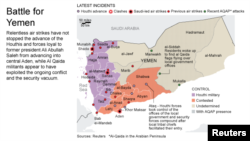Iran has proposed a peace plan to end the conflict in Yemen, but the idea has received little support from regional rivals like Saudi Arabia. They accuse Tehran of backing the Houthi rebels, who have forced Yemen’s president to flee to Riyadh, and have taken over swaths of Yemen. Analysts say the conflict is being fueled by the Sunni-Shi'ite rivalry between the two regional powers.
Convoys of trucks carry tanks belonging to the Houthi rebels south towards Aden, scene of the heaviest clashes with pro-government forces.
The rebels’ advance is being slowed by airstrikes led by Saudi Arabia. Speaking in Madrid Tuesday, Iranian Foreign Minister Mohammad Javad Zarif strongly criticized Riyadh’s actions.
“We believe that aerial bombardments are simply not the answer, because there is nothing of military value in Yemen to bombard,” said Zarif.
Iran denies involvement
Zarif denied Iran was destabilizing Yemen by backing the Houthis and proposed a four-point peace plan.
“I believe that there is every reason that if all of us helped, there will be a broad-based, friendly government in Yemen to all its neighbors and that should be our objective," said Zarif. "So four points; cease-fire, humanitarian assistance, inter-Yemeni dialogue and a broad-based government friendly to all its neighbors.”
Such peaceful overtures from Iran should be treated with caution, argued Davis Lewin of The Henry Jackson Society a Britain-based policy group.
“They are not our allies in calming the situation, as you can see with Pakistan now being drawn in against an Iranian proxy, the Houthis in Yemen,” said Lewin.
Tehran vs. Riyadh
Iran denies it is providing military support to the Houthis; but Yemen is shaping up as a battleground between Tehran and Riyadh, said Professor Fawaz Gerges of the London School of Economics, who spoke to VOA via Skype.
“This regional rivalry between the two regional superpowers is really pouring gasoline on a raging fire in multiple theaters: in Syria, in Iraq, in Lebanon, and now in Yemen. The Saudi-Iranian rivalry is turning an essentially political conflict into not only a war by proxy, but also into a sectarian conflict,” said Gerges.
Gerges said the Houthis are not seen as Shi’ite allies of Iran within Yemen; but, the country’s Sunni population nevertheless feels threatened as sectarian tensions rise - and that could create fertile ground for extremism.
“If this conflict continues, as seems to be the case, my take on it is that al-Qaida in the Arabian Peninsula and most probably ISIS, the so-called Islamic State, will find a social base of support,” said Gerges.
The United Nations imposed an effective arms embargo on the Houthi rebels Monday. The United States’ ambassador to the U.N., Samantha Power, explained Washington’s support for the move.
“... which imposes consequences on the Houthi and former president [Ali Abdullah] Saleh, demands that the Houthi cease military operations and calls on all sides to once again return to the negotiating table,” she said.
If there is no negotiated settlement, analysts warn sectarian forces from across the region could be drawn into a full-scale civil war.






